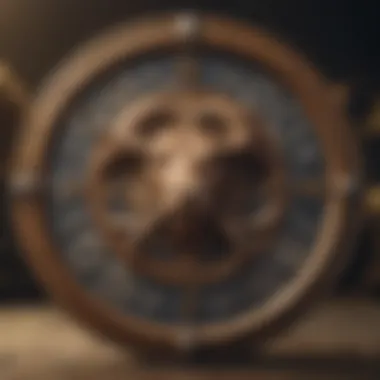Understanding Your Astrological Chart: An In-Depth Guide


Intro
Astrology has captivated the minds of humankind for centuries. Many believe that the position of celestial bodies at the time of one’s birth can offer insight into personal traits and life paths. Diving into your astrological chart can be an enriching experience, as it serves not merely as a celestial map but as a guide to understanding oneself and others better. This guide ventures into the fundamental aspects of astrology, making it accessible even to those who are just stepping into the cosmic domain.
Astrological Concepts
Understanding astrology starts with grasping some vital concepts that form the basis of the practice.
Definition of Key Terms
Astrology is a complex web of terminology. Here are some core terms you’re likely to encounter:
- Astrological Chart: A visual representation of where the planets and other celestial bodies were placed at the exact moment of an individual's birth.
- Ascendant: Also known as the rising sign, it indicates the zodiac sign that was rising on the eastern horizon at one's birth.
- Houses: Twelve segments of the chart that rule different areas of life, such as relationships, career, and home.
- Aspects: Angles formed between planets that denote relationships between different celestial influences.
Historical Background of Astrology
Astrology isn’t just a modern phenomenon; its roots dig deep into ancient civilizations. From the Babylonians who meticulously documented celestial movements to the Egyptians, who linked the cosmos to their deities, astrology has been a tool for understanding the universe. Each culture added its flavor to astrological practices, leading to a rich tapestry of beliefs and methods still prevalent today.
Overview of Different Astrology Branches
Astrology branches out into various forms, with each offering distinct perspectives:
- Natal Astrology: Focuses on the individual’s birth chart, analyzing personality and life path.
- Mundane Astrology: Deals with events affecting nations and global occurrences, assessing how celestial movements correspond to worldly events.
- Horary Astrology: A technique used to answer specific questions by examining the positions of celestial bodies at the time the question was asked.
- Electional Astrology: Helps in selecting auspicious moments for beginning new ventures, based on favorable planetary alignments.
"Astrology is the study of cycles, and like a clock, it can help us understand the time we are living in." - Unknown Author
The above disciplines present various lenses through which to interpret the cosmos, enriching our understanding of our astrological charts.
Zodiac Signs Exploration
At the heart of astrological practice are the twelve zodiac signs, each with its unique attributes and insights.
In-Depth Analysis of Each Sign
Each zodiac sign is represented by elemental groups - Fire, Earth, Air, and Water, encompassing a spectrum of personality traits. For instance, Aries, as a fire sign, ignites passions and encourages forward movement, while Taurus, grounded in earth, reflects stability and reliability.
Personality Traits and Characteristics
While the sun sign is often highlighted, other elements like the moon sign and rising sign contribute to a fuller picture of personality. For instance:
- Leo: Known for bravery and leadership, yet prone to stubbornness.
- Cancer: Intuitive and nurturing, but can sometimes retreat into their shells when feeling vulnerable.
Historical and Mythological Connections
Each sign is steeped in rich mythology. For example, Aquarius corresponds with the water bearer, symbolizing humanitarian pursuits, while Scorpio holds ties to transformation and mystery, rooted in tales of ancient mythology.
Celestial Events
Understanding celestial events is equally important, as they provide context and timing within astrology.
Major Cosmic Phenomena
Key celestial events such as eclipses, retrogrades, and solstices can significantly influence astrological interpretations. For instance, a Mercury retrograde is notorious for communication mishaps and revisiting unresolved issues.
Impact of Celestial Events on Astrology
Astrologers often pay close attention to these phenomena, using them as markers for personal growth and as catalysts for change. They can serve as reminders to slow down, reflect, and recalibrate in life.
Rituals and Practices During Celestial Events
Many practitioners engage in specific rituals during significant celestial events. Whether it’s setting intentions during a new moon or cleansing crystals during an eclipse, these practices can enhance the experience and offer deeper connections with the cosmic energies in play.
Exploring one’s astrological chart requires time and patience, but in that journey, you can find not just answers, but also valuable insights into the very essence of your being.
Understanding Astrological Charts
Understanding astrological charts is like peeling back the layers of your life’s narrative. It’s not simply about positing a belief in celestial influence; it’s about grasping how these cosmic arrangements reflect the currents that shape your existence. By diving into this area, we illuminate how personalized insights can aid one’s journey of self-discovery and evolution. An astrological chart encapsulates the moment of your birth—an imprint of the universe’s unique alignment that continues to influence your traits, decisions, and connections long after that moment.
In essence, an astrological chart serves as a blueprint of one's potential. This blueprint provides a deeper connection to personal motivations, aspirations, and relational dynamics. Rather than viewing astrology as mere superstition, consider it a helpful compass for those navigating the often-murky waters of life. It's like having a roadmap that not only shows you the terrain but also highlights the routes best suited for your journey.
Definition and Importance
An astrological chart is essentially a graphic representation captured at the precise moment of one’s birth. It showcases the positions of planets, the sun, the moon, and vital astrological houses across the twelve zodiac signs. The importance of an astrological chart can't be understated, as it grants an individual a snapshot of the cosmic forces at play in their life, offering clues to their strengths and challenges. It’s a reflective tool that, when understood, can pave the way for self-awareness and informed life choices. Without it, one may feel like a ship adrift on a vast ocean, lacking direction and clarity.


Key Components of an Astrological Chart
Diving deeper into the structure of an astrological chart, three fundamental elements come into play: planets, houses, and signs. Each component adds a unique flavor, contributing to the astrological tapestry that informs personal dynamics and potential.
Planets
Planets in an astrological chart represent various aspects of one’s personality and experiences. Each planet embodies different energies and influences. For instance, Venus is often associated with love and beauty, whereas Mars signifies drive and ambition. The location of these planets in the chart reveals how these energies manifest in one's life. Understanding planetary positions can be particularly beneficial for those seeking to harness their strengths or address challenging aspects of their character. Moreover, because planets shift through the zodiac, one might catch a glimpse of their transiting effects, which can offer valuable insights into current life events.
Houses
Houses are an equally critical aspect, with each one representing different areas of life—such as career, relationships, and home. For instance, the 7th house relates to partnerships, whereas the 10th house focuses on career and public image. What makes houses intriguing is how they contextualize planetary placements. The interaction between the planets and the houses can illuminate specific life themes, giving clarity where ambiguity often lurks. If one’s Venus resides in the 6th house, they might find love blossoming in daily work environments, illustrating how context can shape personal experiences.
Signs
Signs denote the energy expression of both planets and houses, providing a distinctive color to each chart. A planet in Aries might embody boldness and leadership qualities, while the same planet in Pisces could express more sensitivity and intuition. It's the signs that refine the raw energy of planets and houses into something comprehensible and relatable. Understanding your signs can also unveil behavioral patterns that you may either embrace or seek to modify. Each sign possesses its unique attributes—knowing whether you are a fiery Leo or a contemplative Virgo can help you recognize your inherent tendencies in various life scenarios.
"An astrological chart is not just cosmic decorations; it’s a narrative waiting to be read."
By delving into the aspects of planets, houses, and signs, one can truly start to appreciate the nuances of their astrological chart. This comprehensive understanding forms the foundation upon which personal insights, growth, and development can be built.
The Role of Astrology in Personal Insight
Astrology has long been revered as a tool of self-discovery. There’s something undeniably intriguing about the way the positions of celestial bodies create a personal map of our character, potentials, and life experiences. The role of astrology in personal insight conceives a bridge between ancient teachings and modern life applications. By studying the nuances of your astrological chart, you can unveil aspects of your personality and your path that you might not have contemplated otherwise.
Self-Awareness and Growth
Astrology serves as a lens, magnifying our inner worlds and helping us to better understand ourselves. The process begins with the foundational elements of your astrological chart—the planets, signs, and houses—each playing unique roles in shaping your psyche. For instance, if your Moon sign reveals a strong emotional core, understanding this can open doors to emotional literacy. This self-awareness is the first step to personal growth.
When we comprehend our intrinsic natures, we also highlight areas ripe for development. Are you too quick to anger? Positive aspects of the Mars placement might indicate a fiery spirit. Recognizing this as a pattern allows for targeted growth.
- Identify Patterns: Recognizing recurring themes in your chart can reveal ingrained tendencies.
- Embrace Your Complexity: Each chart tells a story. Understanding this narrative cultivates compassion for oneself.
- Set Intentions: With new insights, you can set specific goals for personal transformation.
Astrology isn’t just about prediction; it's a lifelong companion in our self-improvement journey, aiding us to adapt and evolve as we face life’s trials and tribulations.
Decision Making and Life Path
The influence of astrology extends, compelling us to reflect on decision-making and guiding life choices. Our astrological charts can shed light on optimal periods for significant decisions—when to leap in love, change careers, or pursue a new venture.
Astrology introduces a rhythm to decision-making that aligns you with cosmic flows. Have you ever noticed a pattern where attempts to change jobs during Mercury retrograde led to confusion? Recognizing such celestial patterns arms you with foresight, allowing you to navigate life’s choices in a more informed manner.
"The stars impel, they do not compel." - This ancient wisdom encapsulates the essence of astrological guidance: it's about alignment, rather than fate.
- Timing Is Key: Identifying suitable times for pivotal decisions enhances the likelihood of success.
- Navigate Challenges: Understanding challenging transits can help you prepare and approach life’s hurdles strategically.
- Trust Your Intuition: With your chart illuminating your unique pathways, cultivating a trust in your instincts becomes easier.
Ultimately, integrating astrology into your life paves the way for informed decision-making, standing as a compass for your journey while nurturing a deeper understanding of your life's purpose.
Finding Your Astrological Chart
Finding your astrological chart is the first step toward understanding the celestial influences that shape your personality and life experiences. This process opens up a treasure chest of insights that can guide personal development, enhance self-awareness, and inform life decisions. By mapping the positions of celestial bodies at the moment of your birth, you can begin to grasp how these alignments reflect and influence different aspects of your life.
Basic Requirements
To successfully generate an astrological chart, there are three essential pieces of information you must gather: your date of birth, time of birth, and place of birth. Each one plays a critical role in creating an accurate and meaningful chart.
Date of Birth
The date of birth is foundational in astrology. It provides the basic framework of your sun sign, which is often the first thing people learn about astrology. The sun sign signifies the core of your personality, highlighting characteristics that may govern your behavior and emotions.
One of the key traits of the date of birth is its universality; every person who shares the same birthday tends to fall under the same sun sign. This aspect can foster a sense of community among people. However, the uniqueness of your astrological chart goes beyond just the sun sign, as nuances develop from the other components involved.
A key advantage of focusing on your date of birth is its accessibility. Anyone can easily find their sun sign, making it a popular entry point into astrology. Yet, it can be somewhat simplistic. Relying solely on sun sign can lead to sweeping generalizations, so it’s beneficial to explore deeper layers of your chart for more personalized insights.
Time of Birth
The time of birth serves as one of the most significant factors in constructing an astrological chart, as it determines the positions of the planets in the houses. This timing influences not just personality traits but also potential life events and cycles.
A noteworthy characteristic of time of birth is its precision. Even a difference of a few minutes can shift planetary positions drastically, leading to distinct differences in individual charts. This aspect underscores the importance of exact birth time for accurate interpretation.
The benefit of using time of birth is that it allows for a nuanced understanding of how various planetary energies operate in different areas of your life, such as career, relationships, or personal growth. However, not everyone has access to precise timing, which can complicate chart generation.
Place of Birth
The place of birth acts as the geographical context for your astrological chart. It helps define the local astrological horizon and, together with the date and time of birth, constructs the houses of your chart. Each house represents a different aspect of life, providing a lens through which to view the positions of planets.
A key feature of place of birth is its ability to anchor your chart to the physical world, aligning celestial influences with your immediate environment. This connection can reveal how different environments and cultures impact your development, experiences, and relationships.


While having your place of birth is generally straightforward, it can pose challenges if you're unaware of the specific location or if it has changed over time. Nevertheless, this information is essential for achieving an accurate and comprehensive astrological portrait.
Online Tools and Resources
In the age of technology, accessing your astrological chart has been simplified significantly.
There are numerous online tools and resources that can generate your chart almost instantaneously once you input your accurate data. Websites like Astro.com and Cafe Astrology offer extensive options for creating detailed charts, along with interpretations that can help you understand what the various placements mean.
These tools cater to a range of experience levels, from those who are unsure how to read a chart to seasoned astrologers looking for more advanced functionalities. Whether you seek a quick overview or an in-depth analysis, online resources have made it easier to embark on your astrological journey.
Interpreting Your Astrological Chart
Understanding how to interpret your astrological chart is crucial for anyone who wishes to delve into the depths of personal insight. Your astrological chart acts as a celestial map, detailing the arrangement of the planets, houses, and signs at the moment of your birth. This interpretation provides a framework to explore your unique personality traits, strengths, and challenges. Essentially, it's about connecting the cosmic dots in a way that reveals your authentic self. This section will discuss the main components of interpretation, the benefits of understanding these elements, and the various considerations to keep in mind.
Reading Planetary Positions
The positioning of planets in your chart is paramount. Each planet represents different facets of your personality and influences various aspects of your life. For example, your Sun sign may capture your core identity, but the Moon represents your emotional instincts, while Venus sheds light on your relationships. By mapping these planetary positions, you can gain insight into potential behavioral patterns or tendencies. This knowledge helps to create a nuanced understanding of not just who you are, but why you may react in certain ways to life’s challenges.
Let's break down some key planets and their meanings:
- Sun: Core self, identity, and vitality.
- Moon: Emotions, instincts, and inner self.
- Mercury: Communication style and thought processes.
- Venus: Love, beauty, and relationships.
- Mars: Drive, aggression, and ambition.
By carefully examining where these planets land in your chart, you unveil a deeper narrative about your life's journey.
Understanding House Significance
Each astrological house in your chart symbolizes different life areas, from relationships to career to spirituality. There are twelve houses, each holding its own significance. The position of planets within these houses hints at where you may confront challenges or find fulfillment in your life. For instance, if your Venus sits in your 7th house, your relationships may be a focal point for growth, requiring attention and nurturing.
Here’s a simplified look at the twelve houses:
- First House: Self, appearance, beginnings.
- Second House: Money, personal values, possessions.
- Third House: Communication, immediate environment.
- Fourth House: Home, family, emotional foundation.
- Fifth House: Creativity, romance, children.
- Sixth House: Daily routines, health.
- Seventh House: Partnerships, marriage, contracts.
- Eighth House: Transformation, shared resources.
- Ninth House: Philosophy, higher education, travel.
- Tenth House: Career, public life, ambitions.
- Eleventh House: Friendships, social networks.
- Twelfth House: Subconscious, hidden matters.
Understanding which planets reside in these houses can signal areas of your life that might require a little more focus or present opportunities for growth.
Sign Meanings and Their Influence
Astrological signs add another layer to the interpretation of your chart. Each sign carries its own energy and flavor, influencing how the planets express themselves. For instance, if you have a Moon in Pisces, your emotional landscape may be characterized by sensitivity and compassion. A Mars in Capricorn could manifest as ambition and a strong work ethic.
Here’s how you might consider sign influence:
- Fire Signs (Aries, Leo, Sagittarius): Typically embody passion and dynamism.
- Earth Signs (Taurus, Virgo, Capricorn): Often represent practicality and stability.
- Air Signs (Gemini, Libra, Aquarius): Known for intellect and communication skills.
- Water Signs (Cancer, Scorpio, Pisces): Usually depict emotion and intuition.
Understanding how your planetary positions relate to their corresponding signs provides a full-bodied perspective. It's not merely about where they sit, but how they interact—multidimensional rather than flat narratives emerge.
By interpreting your astrological chart through the lenses of planetary positions, house significance, and sign meanings, you're better equipped to traverse your life's unique path. This knowledge empowers you to understand your strengths, navigate challenges effectively, and ultimately grow toward being your most authentic self.
Astrological Aspects
Astrological aspects are vital components of chart interpretation that can provide deeper insight into an individual's personality and life experiences. They illustrate the relationships between various celestial bodies, revealing how their energies interact in your chart. This section dives into the different types of aspects, highlighting their unique characteristics and their significance in decoding your astrological destiny. Understanding these elements enhances your ability to read your chart effectively, offering a richer context for your personal growth and understanding of others.
Types of Aspects
Conjunctions
Conjunctions occur when two planets are positioned closely together, usually within a range of 0 to 10 degrees apart. This aspect symbolizes a powerful blending of energies. In a chart, the influence of Conjunctions can amplify the attributes of the planets involved. For instance, if the Sun aligns closely with Mars in your chart, you may exhibit a robust sense of determination and vitality.
The distinct feature of conjunctions is that they create a shared focus, making them popular among astrologers. They might represent periods of intense creativity or motivation. However, the downside can be an overwhelming intensity that might lead to conflict when the energies clash. Thus, while they are regarded as beneficial, their effects can vary significantly depending on the planets involved and how they are placed in relation to the chart.
Squares
Squares form when planets are about 90 degrees apart, indicating tension between the energies at play. This aspect is often a signal of challenges that spur growth. Imagine a classic tug-of-war scenario: each planet pulls in different directions, compelling you to confront and resolve internal conflicts. Squares encourage personal evolution through the pressures and dilemmas they create.
The hallmark of Squares is their ability to provoke action. They tend to highlight areas where we need to adapt or change; hence, they are often seen as a double-edged sword. On one hand, they can be incredibly frustrating, leading to frustration and anxiety. On the other hand, they serve as powerful catalysts for transformation, pushing you out of your comfort zone and fostering essential growth.
Trines
Trines occur when planets are separated by 120 degrees, considered the most harmonious aspect. This relationship flows effortlessly, often indicating areas where talents and blessings manifest naturally. Think of trines as cosmic gifts that come easily; individuals with prominent trines often possess innate abilities in specific areas, whether it’s creative expression or interpersonal skills.
The key characteristic of a trine is that it creates a supportive environment for personal and professional growth. Because of their favorable nature, trines can be taken for granted if one is not careful; complacency can sometimes follow. While their advantages are palpable, such as ease and opportunity, care must be taken to not overlook the potential for deep learning that could arise from more challenging aspects.
Significance of Aspects in Interpretation
Understanding the significance of aspects in your astrological chart can't be overstated. The way planets interact with each other provides insights not only about potential challenges and strengths but also about underlying motivations and life patterns. Each aspect reveals a different layer of meaning, enhancing the overall narrative of the chart.
Astrologers often interpret these aspects to discern individual traits or predict future experiences. Moreover, by recognizing which aspects dominate in your chart, you can tailor your personal development approaches and strategies in navigating life's complexities. Thus, mastering aspects can lead to a fuller understanding of both yourself and those around you, enriching the astrological journey for you and your relationships.


Utilizing Astrology for Personal Development
Personal development is a continuous journey that many of us embark on, aiming to understand ourselves better and make conscious choices in life. Astrology serves as a powerful tool in this regard, offering insights that can illuminate various aspects of our lives. The essence of Utilizing Astrology for Personal Development lies in its ability to bridge our innermost feelings and external realities. When one looks at their astrological chart, they are looking into a mirror reflecting their personality traits, strengths, and challenges. This perspective can guide individuals on how to nurture their talents, confront their weaknesses, and ultimately promote holistic growth.
Applying Chart Insights for Career Planning
Astrology can be particularly beneficial when considering career paths. Each person's unique chart can reveal insights about their vocational inclinations and potential obstacles. For instance, if someone's Midheaven, or the highest point in their chart associated with career visibility, lies in Capricorn, they may naturally gravitate towards structured professions where they can climb the ladder slowly but surely. Conversely, those with their Midheaven in Aquarius might find themselves drawn to unconventional or innovative fields.
Additionally, key planetary placements can shed light on one’s work style and ethical values. A strong presence of Mars, the planet of action, might indicate a penchant for leadership roles and competitive environments. In contrast, a predominant influence from Venus could direct one towards careers in arts or diplomacy, highlighting the importance of interpersonal relationships.
So, when weighing career options, look toward your chart for guidance. Analyzing planetary influences can help streamline your career goals, ensuring they resonate with your intrinsic nature.
Enhancing Relationships Through Astrology
The intricate dance of interpersonal dynamics often leaves us puzzled. Yet, through astrology, we uncover underlying patterns that can enhance relationships significantly. Understanding both your own chart and that of another can provide clarity on compatibility and communication styles. For example, someone with a Moon in Scorpio may have intense emotional needs, while their partner with a Moon in Gemini might prefer a lighthearted, social approach. Recognizing these differences lays the groundwork for empathy, enabling each person to adapt their communication style for mutual understanding.
Astrological synastry, which analyzes how two charts interact, can identify where the friction lies and where harmonious aspects exist. Knowing these traits aids in tackling issues before they escalate into conflict, allowing for healthier discussions based on astrological insights.
In forming relationships, it's crucial to consider how Venus and Mars influence each party. Venus governs love and attraction, while Mars embodies desire and passion. Hence, a deeper understanding of where these planets lie in both charts can reveal how partners can better meet each other's needs, fostering a stronger emotional bond.
"Astrology is a law of probabilities, not certainties. It’s a language of symbols, constantly reminding us of where we stand and where we may choose to go."
In summary, whether it's navigating career choices or enhancing personal relationships, astrology is a rich reservoir of insights waiting to be explored. Understanding your astrological chart not only illuminates possibilities but also fosters an environment for deeper self-exploration and connection with others.
Common Misconceptions about Astrology
Astrology has often danced in the shadows of skepticism, many brushing it off as mere superstition or a whimsical play of words. However, this section aims to shed light on common misconceptions surrounding astrology, promoting a deeper understanding and addressing the misconceptions that can cloud its true value. Recognizing these misunderstandings is crucial for both practitioners and those merely curious, allowing for a more nuanced discourse on the subject. It’s vital to separate fact from fiction and explore how astrology can be a beneficial tool for personal insight rather than a frivolous belief system.
Astrology vs. Astronomy
One of the most pervasive misconceptions is the conflation of astrology with astronomy. While these two fields share a rich history, they serve distinctly different purposes. Astronomy is essentially the scientific study of celestial objects, space, and the universe as a whole. It focuses on measurement, observation, and the laws governing celestial bodies.
On the other hand, astrology contemplates the influence these celestial bodies have on individual lives and personality traits. The roots of both fields intertwine, as early astronomers were often astrologers. However, modern astronomy has dismissed astrology as a science. It’s founded on empirical evidence and rigorous observation methodologies, while astrology embodies interpretations, guiding principles, and a touch of artistry.
- Astronomy:
- Astrology:
- Deals with the physical universe.
- Bases findings on observations and measurements.
- Embraces a scientific framework.
- Looks at celestial influences on human affairs.
- Involves interpretive analysis rather than empirical measurement.
- Functions more as a guiding philosophy than strict science.
Understanding the distinction is paramount. Astrology does not seek to negate the studies of astronomy, but rather complements them by offering a perspective on how cosmic events might resonate with earthly experiences.
"Astrology serves as a mirror, reflecting the cosmos within ourselves."
Debunking Myths in Astrological Practices
The landscape of astrology is often muddied by various myths and a lack of clear understanding. One widespread myth suggests that astrology only provides vague generalizations applicable to anyone. However, a detailed astrological chart—crafted from the precise time, date, and place of one's birth—provides very specific insights into an individual’s character and life patterns. This is far from a one-size-fits-all phenomenon.
Another misconception is that astrology predicts the future with certainty, like a crystal ball. In reality, astrology offers guidance based on planetary positions and their influences but does not dictate outcomes. It suggests possibilities and tendencies rather than fixed destinies. This nuance is critical. Astrologers interpret charts, and while these interpretations can provide insightful information about likely outcomes, personal choice and free will remain at the forefront.
- Common Myths:
- What’s True:
- Astrology gives general predictions applicable to everyone.
- Astrological readings can predict exact future events.
- Only sun signs are relevant in astrology.
- Personalized charts yield unique insights.
- Astrology indicates tendencies rather than certainties.
- Moon signs, rising signs, and other planetary placements are equally important.
Addressing these myths can open a dialogue about the authentic practices and perspectives within astrology. This can encourage a more profound appreciation for the complexity and relevance of astrological study today.
The Future of Astrology
The future of astrology holds a unique position within both the realms of the esoteric and the scientific. Today’s world, with its rapidly changing dynamics, presents astrology not just as a tool for self-discovery but as a bridge connecting ancient wisdom with modern understanding. As society increasingly turns to alternative insights beyond conventional science, astrology finds itself reclaiming its space in both individual lives and broader social contexts.
Trends in Modern Astrology
Astrology is evolving, and its trends reflect broader societal shifts. Perhaps one of the most significant trends is the rise in personalized astrology. No longer is it sufficient for individuals to look at generalized horoscopes that employ broad brushstrokes. Instead, people crave tailored experiences, looking deeply into their personal charts and the specific nuances therein. This shift is stimulating a more nuanced understanding of astrology.
Moreover, communities are forming around various astrological practices. With platforms like Reddit and Facebook, enthusiasts connect, share insights, and debate interpretations, creating dynamic dialogues where collective wisdom flourishes. These spaces are not only for sharing but for learning — often debunking myths while investigating new syncretic forms of astrology, fusing different cultures’ interpretations and applications.
Another trend is the integration of psychological insights into astrological interpretations. The modern astrologer often combines psychological theories with astrological analysis to provide a more holistic view. They apply tools from psychology to help individuals interpret their charts in ways that resonant deeply with their inner selves. It allows for a shared journey of growth rather than mere predictions.
Astrology in the Age of Technology
This is indeed an exciting time for astrology, especially with the advancements in technology. Astrological software has come a long way, enabling even the most novice users to generate detailed charts and interpretations. Comprehensive tools that analyze intricate aspects of planetary positions are available at the click of a button.
Moreover, apps dedicated to astrology have soared in popularity. They provide daily insights, highlight transits, and connect users with community discussions. This availability of astrological information, once confined to books and experts, is now democratized, allowing anyone with a smartphone to engage in their celestial narratives.
But technology also brings challenges. With vast amounts of unfiltered information online, discerning credible sources becomes crucial. The overlap of astrological discussions with social media trends can dilute meaningful practice in favor of viral content. Therefore, a balance must be struck between technology's accessibility and the deeper, more meaningful exploration of astrology's complexities.
"Astrology is not a definitive guide, but a language of potential. It does not dictate, but rather presents the probabilities of existence."
As we forge ahead, the future of astrology appears to be one that is rich with possibilities, blending tradition with innovation. Embracing these trends while being mindful of the integrity of astrological interpretation will shape a more profound understanding of ourselves and the cosmos.







